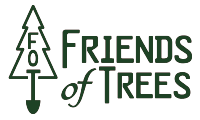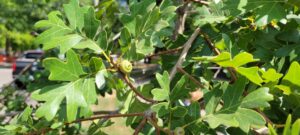Category: Portland Canopy
FAQ: The end of Friends of Trees’ Portland partnership

In response to a February 2022 report detailing Portland’s loss of tree canopy, Friends of Trees was contacted by numerous members of the public, by reporters, and by supporters. Given the need for more trees in Portland, questioners wondered, Why is the City of Portland’s Bureau of Environmental Services ending its longtime partnership with Friends of Trees? Toward trying to address the situation with as much transparency as possible, Friends of Trees’ executive director Yashar Vasef submitted an Op Ed to the Oregonian, which was published on April 3.
Since we posted this information about our Op Ed in April, there has been additional media coverage about this important issue:
OPB story by April Ehrlich, July 11, 2022: Portland’s unfriendly treatment of Friends of Trees
Oregonian editorial July 10, 2022: A puzzling change to a partnership that worked
In response to our Op Ed and other media coverage there have been some statements issued by the City that could be considered incomplete, and in some cases misleading, when taken out of context. Friends of Trees addresses those statements and other frequently asked questions here. We’ll update this as needed.
Q: What is Friends of Trees doing in response to the end of its city partnership?
First, it’s important to emphasize that Friends of Trees isn’t going anywhere. Thanks to our massive network of volunteers and generous donors, along with supportive municipal partners throughout the region, we will continue to plant trees and foster climate resiliency in numerous communities throughout western Oregon and southwest Washington.
We are doing everything we can to make sure that there is still community tree planting in Portland. We are talking to partner organizations, community members, and government officials about how we can make tree planting easier, more accessible, and more equitable.
Toward continuing to plant trees in Portland neighborhoods that need them most – and continuing to do so in a way that engages community, and is inclusive and equitable – in partnership with Verde, Cully Air Action Team and other community organizations we will implement a concentrated community tree planting project in Cully and surrounding east Portland neighborhoods, funded privately, in our 2022-23 season. You can read more about this project in the July 2022 edition of our enews, Treemail, (you can sign up to receive Treemail and other Friends of Trees news here).
We will also continue growing our work with other municipalities throughout the region, as we find great value in these partnerships and what they can accomplish. And no matter where we plant, we will plant the Friends of Trees Way.
Q: If Friends of Trees’ City of Portland contract to plant street and yard trees is ending, why is the city issuing statements referencing an active contract, worth up to $1 million, that Friends of Trees has with Portland Parks & Recreation?
The PP&R statement is unfortunately very misleading and only partially describes the actual situation.
This is a version of the statement issued by PP&R and referenced by other city offices and bureaus: “Friends of Trees currently has an active five-year contract with Portland Parks & Recreation, now in its second year. The contract is to plant trees and provide three years of watering and establishment care. Friends of Trees was allocated $139,000.00 for this tree planting season, which they have not fully utilized. They are eligible to provide up to $1 million in contracted on-call services annually, under this contract with PP&R.”
This is the reality:
- This contract with PP&R is separate from the contracts Friends of Trees has had with the Bureau of Environmental Services since 2008, which is now ending after 14 years. Those BES contracts are the contracts that have planted 40,000 street and yard trees with community volunteers.
- Our contract with PP&R was for only two years of tree planting and that portion ends this year; this contract resulted in a total of 130 trees planted over two years. There is no future funding from this contract to plant trees, the remaining three years of the contract are only for tree care (mainly watering).
- The $1 million reference could be especially misleading. Our understanding is that this is standard city contract language for this sort of contract, and that it’s in all contracts under $1 million (with different language for contracts over $1 million). We were not made aware of any potential to receive anywhere near $1 million annually to plant trees through this contract with PP&R.
- The trees planted through this contract are “opt out” plantings, meaning that the city identifies addresses where a street tree could be planted, they alert the property owner that a tree will be planted, and the property owner can then “opt out” (or, say no) if they do not want a tree. This method of tree planting does not involve any community engagement and, per the contract, volunteers cannot be involved.
- Via this contract, in the beginning of our current planting season (which runs October – April) Friends of Trees received a list of addresses to plant a total of 80 trees, which we did; these trees were not planted with community volunteers. In February 2022, while we were in the midst of our community tree planting season, we were asked if we’d like another list of addresses to plant more trees; since we were in the middle of our season and this additional list was unexpected – and since this method of tree planting is not the Friends of Trees Way (engaging volunteers, building relationships with tree recipients, and more) – we declined. This is why the full $139,000 contract was not utilized.
Q: What’s wrong with the City planting trees themselves?
Absolutely nothing! We want the City to plant trees. We do not believe that this issue is us versus them. There is an important role for government to play in planting and caring for trees.
We believe that it’s also important to include community organizations in those efforts. We want to help, and we want our partner organizations to be able to help. The more trees that get planted, the better. Be it with the City, Friends of Trees, or other community organizations, all avenues to tree planting should be open.
In addition to getting trees in the ground, Friends of Trees adds unique value to the process through community engagement. We have been involving community members in tree planting for over 30 years. Our staff has knowledge that goes beyond tree planting and tree care to volunteer engagement and education. Authentic engagement with the community always leads to more success for the tree.
Q: Will Friends of Trees be planting trees in Portland next season?
Yes, but it will be different. You won’t see the same amount of neighborhood tree planting events that we are so well-known for. But we will continue planting trees and native plants in natural areas within the City, and we are still seeking funding to expand to other environmental justice geographies for future seasons.
Q: What can you do to help?
First of all, thank you for your support of community tree planting! We hope that you utilize our democratic system to make your voice heard. We encourage you to contact your elected officials and let them know that you want to see an investment in community tree planting in Portland.
You can also support community tree planting organizations like Friends of Trees. Additionally, we invite you to support some of our partners who are impacted by this loss of funding from the City, including the Blueprint Foundation, Portland Opportunities Industrialization Center (POIC), Wisdom of the Elders and Asian Pacific American Network of Oregon (APANO), and organizations like Trees for Life that are addressing crucial issues like shade equity.
Together we can grow the canopy: Friends of Trees Op-Ed
By Yashar Vasef
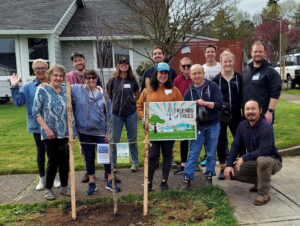
On Sunday, April 3, The Oregonian published an Op-Ed that I wrote: “Amid shrinking canopy, community tree planting needed more than ever.” In it, I address Portland’s reported tree canopy loss and the end of our contract with the City of Portland to plant street and yard trees in the city. We appreciate the opportunity to bring attention to the importance of community tree planting and we are so grateful for all the support we’ve already received.
We wanted to share its contents with you, and answer some of the questions you may have after reading it.
Opinion: Amid shrinking canopy, community tree planting needed more than ever
The recent report about the loss of tree canopy in Portland is yet another piece of grim news related to how the climate crisis is threatening the health of our environment and our community (“Portland tree canopy has stagnated or shrunk, harming city’s climate change aspirations,” March 22). The report indicates that Portland’s urban tree canopy has shrunk or plateaued for the first time in 50 years – a warning that the city will not be able to meet its goal of having tree canopy encompass 33% of the city’s area by 2035.
Unfortunately, the release of the report coincides with the end of Friends of Trees’ 14-year contract with the city to plant street and yard trees through community planting events. This nationally-replicated partnership between Friends of Trees and the city has added nearly 40,000 street and yard trees throughout Portland since 2008, while engaging thousands of community members as volunteers to plant and care for these trees. About 70% of those trees were planted in underserved, low-canopy neighborhoods to address inequities in the distribution of Portland’s trees.
We truthfully do not know why this successful partnership is ending. There has been an abundance of rumors and speculation, but all we know is that our contract ends this June and we do not know of any city plan to invest in programs that center authentic community engagement in planting street and yard trees in Portland. Especially as we see accelerating and intensifying climate impacts right here at home, fighting climate change needs all hands on deck: government, nonprofits and communities collaborating with a necessary sense of urgency.
It’s not just about ending a contract with Friends of Trees—we understand that contracts end and terms change. But given that we are experiencing a true climate crisis, we don’t believe this is the time to cut a successful tree planting program that also builds community through bringing volunteers together to help grow our urban canopy. Tree planting is one of the best tools at our disposal, and we encourage our city leaders to increase and broaden investments in community tree planting – with us or with others – and to pursue other proven strategies that fight climate change, promote climate action and foster climate justice.
Friends of Trees is fortunate to have growing support throughout the region and from other municipalities. We want to keep our momentum here in Portland, too, where we can harness our established partnerships, volunteer resources and community buy-in to contribute to the efforts to plant more trees in Portland. We believe that the city should continue to fund community tree planting; of course, we would love to be included in that funding, and we think other organizations should be included, too. This is the time to grow public investment in trees, not cut back.
We need trees more than ever, for their ability to improve air quality, store stormwater, provide shade, improve the mental and physical health of our community members and so much more. That’s why we engage trained volunteers to check on and help care for each tree after it gets planted. Post-planting care and assessment, combined with ongoing communication with tree recipients, contributes to a 95%-plus survival rate.
Community planting nurtures more than trees. Our events engage volunteers of all ages, races, religions, sexual orientation, gender identity, economic status and political views to plant and care for trees together. We partner with other organizations that center climate justice and engage people from historically underserved communities to directly play a part in improving the health and livability of their neighborhoods. It includes environmental education and internships that expand opportunities to enter the green workforce. Authentically engaging communities is crucial toward achieving climate justice.
There is a ripple effect from participating in tree planting that goes beyond the trees and the many benefits they provide. We have seen firsthand how planting and caring for trees increases community members’ engagement with the environment and participation in civic life, especially when it comes to climate action. An investment in community tree planting is an investment in stewarding future climate action.
We recognize that the end of this partnership raises questions about the future of our work, particularly in Portland. While the partnership with the City has been a significant part of our organization’s history, there’s so much else that Friends of Trees provides to the community, and we will continue to keep engaging volunteers to plant and care for as many trees and native plants as we can in Western Oregon and Southwest Washington.
Q: What is Friends of Trees doing in response to this development?
We are doing everything we can to make sure that there is still community tree planting in Portland. We are talking to partner organizations, community members, and government officials about how we can make tree planting easier, more accessible, and more equitable.
We will also continue growing our work with other municipalities throughout the region, as we find great value in these partnerships and what they can accomplish. And no matter where we plant, we will plant the Friends of Trees Way.
Q: What’s wrong with the City planting trees themselves?
Absolutely nothing! We want the City to plant trees. We do not believe that this issue is us versus them. There is an important role for government to play in planting and caring for trees.
We believe that it’s also important to include community organizations in those efforts. We want to help, and we want our partner organizations to be able to help. The more trees that get planted, the better. Be it with the City, Friends of Trees, or other community organizations, all avenues to tree planting should be open.
In addition to getting trees in the ground, Friends of Trees adds unique value to the process through community engagement. We have been involving community members in tree planting for over 30 years. Our staff has knowledge that goes beyond tree planting and tree care to volunteer engagement and education. Authentic engagement with the community always leads to more success for the tree.
More FAQ with additional information is here, we will update as needed. Thanks so much for supporting trees + community!
Get to Know our partner, APANO
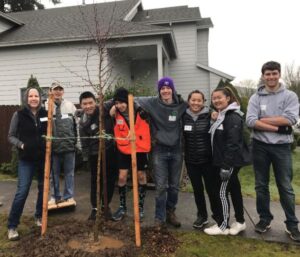
The Asian Pacific American Network of Oregon operates under the principal we are stronger together
APANO’s Policy Director Richa Poudyal talks about APANO’s goals for the Robert Wood Johnson Foundation project:
What is the #1 thing readers should know about APANO?
APANO envisions a just world where Asians and Pacific Islanders and communities who share our aspirations and struggles have the power, resources, and voice to determine our own futures, and where we work in solidarity to drive political, social, economic, and cultural change. For climate justice work, we are striving for BIPOC communities in Oregon to exercise self-determination to make decisions about how to move towards a more regenerative economy. We do this work in coalition and side by side with community members most impacted by the impacts of climate change.
Why is APANO involved in the Robert Wood Johnson Foundation project?
Within climate justice work, APANO is very interested in creating spaces and structure for place-based community organizing and advocacy. The RWJF project is such a special collaboration between Friends of Trees, PSU, and APANO; it’s collaborations like these that allow multiple organizations to contribute their respective strengths and power to support community members in achieving self determination around greening and localized climate justice work. APANO is so grateful to be a part of this project and to bring a community organizing lens and approach to greening outer East Portland, and to work with Friends of Trees which has the community connections, advocacy skills, and know-how around connecting to and planting trees as a part of a conservation and greening strategy.
What’s the community response to this project?
We are two months into our 12 month project, and are working with an incredible group of twelve community members who live in outer East Portland. Since the kick off of the project has coincided with the heat wave we’ve faced in Portland this year, much of the feedback so far has been around being glad to have a space to do something tangible and locally to actively tackle heat and air quality impacts of climate change that have already been prevalent for our neighbors in outer East Portland. Folks have also expressed gratitude to have the space to connect with others and grieve and process the changes in the land and air around us, mostly caused by humans.
What is the top result APANO would like to see from this project?
For APANO, the primary result that we want to see is community feeling empowered and resourced to both advocate for community-sourced solutions and to create and put forward solutions themselves, outside traditional decision-making institutions.
Thank you Richa! Learn more about APANO.
photo: APANO + Friends of Trees planting event in east Portland
Trees are part of the solution to climate chaos
A letter from executive director Yashar Vasef, with an update about community tree planting in Portland
Friends,
It’s official: We need trees more than ever. Heatwaves, flooding, and all of the increasingly catastrophic effects of climate change make it clear that every day needs to be the day for climate action. Friends of Trees has been planting trees in neighborhoods and natural areas for 32 years; we’re planting street and yard trees that will shade our streets and cool our homes, prioritizing low-canopy, underserved neighborhoods, and we’re also planting native trees and shrubs to help restore sensitive natural areas.
Since 1989 we’ve planted more than 870,000 trees and native shrubs, and we’ve done this through engaging tens of thousands of community members, and while implementing and growing programming that aims to do this work inclusively and equitably.
“At a time when climate change is making heat waves more frequent and more severe, trees are stationary superheroes.” (New York Times, 7/2/2021)
It’s not enough. We are experiencing climate chaos, and trees are increasingly promoted as a major solution, which is why you may have seen Friends of Trees in the news recently. Some of that news focused on our 13 year partnership with the City of Portland Bureau of Environmental Services.
It seemed until recently that funding for our work planting and caring for street and yard trees in Portland was ending, and our concern was that with our funding ending, and without funding being awarded to anyone for community tree planting, this critical work would be suspended for an unknown amount of time. And given climate change’s growing severity, we simply cannot afford to even temporarily pause community tree planting.
It is widely acknowledged that planting trees is a key part of a comprehensive climate strategy. It is our experience at Friends of Trees that planting trees with community members is also key to fighting climate change.
Planting and caring for trees increases community members’ engagement with the environment and overall participation in civic life, including engaging around climate action. There is a ripple effect from volunteering to plant trees that also fights climate change, beyond the actual trees. We expect to have quantitative data supporting this from the research we are conducting through our community grant from the Robert Wood Johnson Foundation, look for an update this winter.
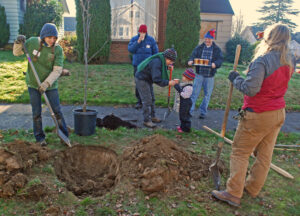
We have since learned that we will receive gap funding to partially continue our Portland tree planting and care efforts through spring 2022, and our deepest thanks go to BES, and also to Commissioner Mingus Mapps’ office, which played a critical role in this positive development. However, there are some significant changes that if implemented would drastically change community tree planting in the City of Portland. As details firm up we will continue to keep you updated.
This particular contract is so important because so much of it has funded planting street trees. Trees play an invaluable role in combating heat islands brought on by climate change, and street trees especially so. Streets and concrete sidewalks absorb and retain heat, and release it at night; street trees help fight this effect and are crucial to cooling neighborhoods.
By now most of us are aware of the inequities with Portland’s tree canopy, one result of which is more heat islands in low-canopy/low-income/under-served neighborhoods. Friends of Trees prioritizes these neighborhoods and will continue to advocate for partnerships and practices that plant trees where they are needed most.
Looking past this upcoming season, BES has said they will issue a new RFP (Request For Proposals) for this sort of work–community tree planting and tree care–sometime this fall/winter, and our understanding is that, while they acknowledge the success of our partnership, they would like to engage other, diverse community partners. And to that we say, Yes!
We fully support BES taking on a new approach to their contracts in a way that prioritizes smaller and BIPOC organizations. It is our belief that uplifting such organizations in this work will make our mission stronger and brings all of us closer to climate justice by introducing voices at the table which were previously shut out. This is why Friends of Trees, during the evolution of our 13 year partnership with BES, has entered into partnerships in this work with organizations such as APANO, Blueprint Foundation, POIC, Verde, Wisdom of the Elders, and others.
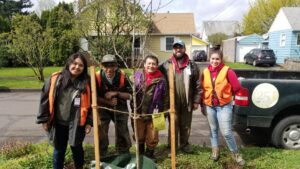
Yes, BES (and all other public and private funders) should absolutely fund more community organizations in the fight against climate change and toward climate justice, and we fully support an open RFP process. As more funders work to diversify their support of community organizations, we encourage an approach that increases the funding pie (as in, make a bigger pie as opposed to cutting smaller slices) so more partners can be included. The planet is literally on fire and NOW is the time to increase investments in climate change.
Now we really have some work to do. We are preparing for the next planting season, and we’re doing so with significantly decreased funding and options for our largest urban tree planting site, the City of Portland. In October, when we kick off our 33rd season of planting and caring for trees as a community, we’ll be coming to you to ask that you support this work like never before, since this will be a season like never before.
A global pandemic, climate change, social injustice and political strife present our community with unprecedented challenges and often devastating impacts. As we all work together to re-envision our future, a future that is green, healthy, equitable and inclusive, we must ask all our policy makers and leaders where do their values lie. And do their budgets address an urgent climate crisis unlike anything humanity has experienced? For the sake of our communities, our natural habitats, climate refugees, wildlife, and the pale blue dot we call home, together, let’s ensure they are up to the task.
All my best,

Yashar Vasef, Executive Director
Photo, top: Gambel oak tree
NOW is the time to get a tree
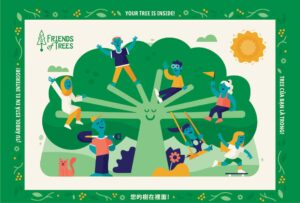
Tree lovers, we need your help! Not only have our community tree planting events changed quite a bit due to COVID, health & safety measures mean we have very limited ability to visit communities and help neighbors get a tree of their own.
Normally we reach thousands of potential tree recipients with door-to-door canvassers and through tabling at community events – things we just can’t do this season.
Less interpersonal interaction means we won’t reach enough households about getting trees planted. And reaching fewer households means that, without your help, our neighborhoods will have far fewer new trees – and we need trees more than ever!
Here’s how you can help:
- Get a tree planted at your home. If you’ve been thinking about getting a tree, now’s the time.
- Talk to your neighbors about getting a tree. How many tree-less front yards are on your street? How about tree-less planting strips? (the area between the sidewalk and street). Visit your neighbors (masked, of course 😉 and help spread the good word about trees through forwarding this email or sharing this link.
Getting a tree with Friends of Trees is easy, informative, and affordable!
- The cost to you for a tree is a very affordable $35. Considering that tree would sell in a nursery for much more, plus when it’s from Friends of Trees you get delivery, a hole dug, expert planters, and post-planting support, it’s a great deal!
- We have a sliding scale available if $35 is too much – name your price! And if you can afford more than $35 anything extra will go to our tree scholarship fund.
- Your tree can be FREE if need be, thanks to our tree scholarship fund (donate to the tree scholarship fund here!)
Check out how easy it is to get a tree, and our wide variety of trees, here.
Questions? Email or call the Tree Team at (503)595-0212. We can’t wait to introduce you to your new tree!
Please note that this information applies to the Portland Metro area; for information about getting a tree in our Eugene service area please contact our Eugene office.
This information was featured in the September 2020 edition of Treemail, our monthly e-news; read the whole issue here, and catch up on other Treemail issues here.
